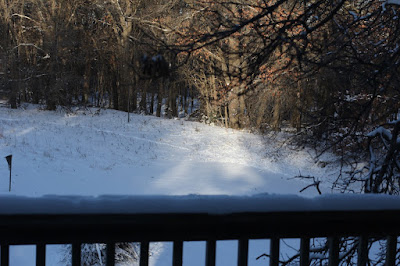We are now in the depths of winter. We don’t ice fish, snowmobile, snowshoe, ice skate, sled, toboggan, etc. It’s a little too early to reorganize and clean the fly fishing gear. Unfortunately, that means it’s time to organize the files for tax filing. Fortunately, that may also turn out to be good practice for organizing the stacks of books we’ve accumulated around the house during the past few years. I think we’ve mentioned before that we’re probably a practitioner of tsundoku, “People who engage in tsundoku at least intend to read the books they buy, in contrast to people with bibliomania, who collect books just for the sake of having them.”
 |
| January brings the depths of winter
Photo by J. Harrington
|
Sometime during the past couple of decades we’ve also developed a habit of partially reading a book and then putting it aside until “we’ll get back to it.” Robert Macfarlane’s Underland: A Deep Time Journey being a classic example. Several times while reading the first few chapters, we suffered mild to moderate claustrophobic willies. We plan on getting back to it next summer, when we can read it outside in the daylight. There’s a handful of others that just aren’t as engrossing as we hoped they’ed be when we bought them. All such volumes are getting stacked on top of one of the book cases in hopes we may actually get organized one of these days and temper new acquisitions long enough to reduce the stacks of unread or partially read to something more manageable.
Maybe that’s why we continue to live in the North Country, despite our dislike of winter weather. If we lived someplace that the weather was tolerable year round, chaos would rule the remainder of our lives because we’d be outside playing all the time. Then again, that might solve our tsundoku.
Tomes
There is a section in my library for death
and another for Irish history,
a few shelves for the poetry of China and Japan,
and in the center a row of imperturbable reference books,
the ones you can turn to anytime,
when the night is going wrong
or when the day is full of empty promise.
I have nothing against
the thin monograph, the odd query,
a note on the identity of Chekhov's dentist,
but what I prefer on days like these
is to get up from the couch,
pull down The History of the World,
and hold in my hands a book
containing nearly everything
and weighing no more than a sack of potatoes,
eleven pounds, I discovered one day when I placed it
on the black, iron scale
my mother used to keep in her kitchen,
the device on which she would place
a certain amount of flour,
a certain amount of fish.
Open flat on my lap
under a halo of lamplight,
a book like this always has a way
of soothing the nerves,
quieting the riotous surf of information
that foams around my waist
even though it never mentions
the silent labors of the poor,
the daydreams of grocers and tailors,
or the faces of men and women alone in single rooms-
even though it never mentions my mother,
now that I think of her again,
who only last year rolled off the edge of the earth
in her electric bed,
in her smooth pink nightgown
the bones of her fingers interlocked,
her sunken eyes staring upward
beyond all knowledge,
beyond the tiny figures of history,
some in uniform, some not,
marching onto the pages of this incredibly heavy book.
********************************************
Thanks for visiting. Come again when you can.
Please be kind to each other while you can.
No comments:
Post a Comment